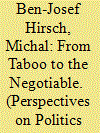| Srl | Item |
| 1 |
ID:
078069


|
|
|
|
|
| Publication |
2007.
|
| Summary/Abstract |
Due to the amplified importance of forging an intimate connection with the American public, modern presidents must adjust their political personalities and leadership. To combat allegations of elitism, recent Republican presidents have adopted anti-intellectualism as a conservative form of populism. Anti-intellectualism is defined as disparagement of the complexity associated with intellectual pursuits, and a rejection of the elitism and self-aware attitude of distinction that is commonly associated with intellectual life. This article focuses on the benefits and costs of anti-intellectualism as a strategic response to the plebiscitary demands of contemporary presidential politics
|
|
|
|
|
|
|
|
|
|
|
|
|
|
|
|
| 2 |
ID:
078066


|
|
|
|
|
| Publication |
2007.
|
| Summary/Abstract |
In the last round of the Israeli-Palestinian peace talks at the Taba Conference (January 2001), Israeli negotiators went where no Israeli officials went before: they considered the right of return of Palestinian refugees, and a quasi-statement that acknowledges the Palestinian tragedy and Israel's share of historical responsibility. This paper argues that at least in part this shift in the negotiations' framework can be traced back to the public debate instigated by the work of Israeli New Historians
|
|
|
|
|
|
|
|
|
|
|
|
|
|
|
|
| 3 |
ID:
078065


|
|
|
|
|
| Publication |
2007.
|
| Summary/Abstract |
Humanitarian and human rights movements have gained influence as impartial ethical responses to injustice and suffering, yet their claims to impartiality are commonly dismissed as misleading, naïve, or counterproductive. To date, little attention has been paid to the very different ways human rights and humanitarian movements have conceptualized impartiality in relation to distinct and conflicting activist goals
|
|
|
|
|
|
|
|
|
|
|
|
|
|
|
|
| 4 |
ID:
078070


|
|
|
|
|
| Publication |
2007.
|
| Summary/Abstract |
In 1960, E.E. Schattschneider noted that every change in the scope of political conflict has a bias; political conflicts that are localized tend to be highly restrictive, while nationalizing conflicts can draw in previously excluded groups. In contrast to this conventional wisdom, this paper suggests that the question of which venues are open to which interests is an empirical one
|
|
|
|
|
|
|
|
|
|
|
|
|
|
|
|
| 5 |
ID:
078068


|
|
|
|
|
| Publication |
2007.
|
| Summary/Abstract |
A new conventional wisdom characterizes the comparative study of electoral politics. Social cleavages, once a stabilizing factor of electoral behavior in Western Europe, are on the wane. Voting decisions have become individualized and old social cleavages have been superseded by new value-related cleavages. This article challenges that view as an exaggeration
|
|
|
|
|
|
|
|
|
|
|
|
|
|
|
|
| 6 |
ID:
078067


|
|
|
|
|
| Publication |
2007.
|
| Summary/Abstract |
The article develops an approach to the study of modular political phenomena (action based in significant part on emulation of the prior successful example of others), focusing on the trade-offs between the influence of example, structural facilitation, and institutional constraints. The approach is illustrated through the example of the spread of democratic revolution in the post-communist region during the 2000-2006 period, with significant comparisons to the diffusion of separatist nationalism in the Soviet Union during the glasnost' era
|
|
|
|
|
|
|
|
|
|
|
|
|
|
|
|